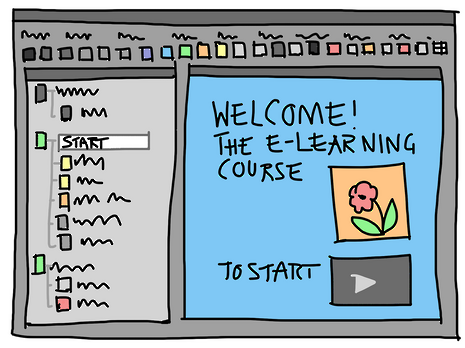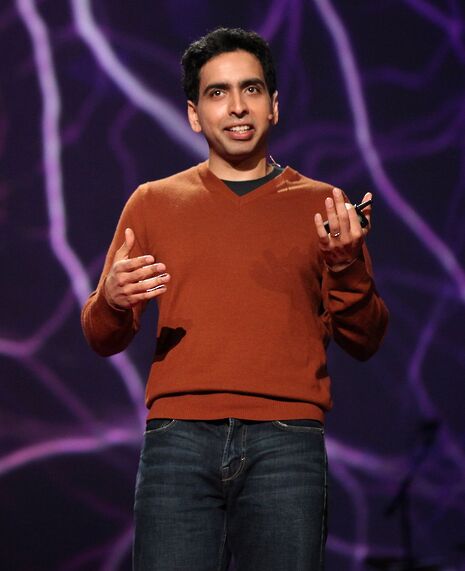What’s next for e-learning?
Are we moving towards a video-learning age? And what does Cambridge have to do with that?

More and more people are turning to snappy, short online videos for information. A report from the Pew Research Centre’s Internet and American Life project finds that online video popularity is growing; 78 per cent of online adults watch or download videos, up from 69 per cent in 2009. Comedy, educational and ‘how to’ videos top the list. Media outlets such as Mic and NowThis use videos shared on social media as their main recourse, covering a range of topics from ‘vet massages tennis ball out of a snake’ to Trump’s presidency. They face the challenge of getting important points across in under a minute, and their treatment of complex issues such as the rights of women in Saudi Arabia can often feel crudely condensed. Videos like these are comprised of a few lines of text accompanied by background images or silent clips, and can often feel like they lack the necessary discourse to thoughtfully explore ideas.
I recently spoke to refreshing new collective Tell Me About who produces fun and engaging videos covering a range of topics in the form of a brief discussion with leading experts. The people behind it are James Walden, Patrick Sylla and Caspar Ramsay, all second-years from Jesus College. Their videos range from 20 seconds to around four minutes long and have so far covered topics including digital privacy, why beer has bubbles in it, and women in science. In each video, Patrick has a discussion with a leading expert in a particular field, and on the whole, they are comprehensible for someone with little knowledge on the subject. They tell me that the videos are aimed at “anyone with an interest and a basic knowledge of the topic of the video – we aren’t targeting anyone in particular. Our overall aim is to broaden the access to great teaching.”
The idea for the channel arose from seeing all of the “great teaching resources in Cambridge” and thinking it was “a shame that they weren’t available to everyone.” Acknowledging the fact that many short videos aren’t always the best source of information, they comment: “Educational videos on YouTube right now often involve one person, who isn’t necessarily an expert in the field, lecturing you about different subjects. We thought that it would be better to hear directly from the expert’s mouth, rather than learning from someone who has just done a bit of research on the issue.”
“Often people come to us and tell us about lecturers that we ‘have to interview’; it’s great to see how many teachers in Cambridge have inspired their students”
Tell Me About
The notion of sharing recourses is key, and in a world where tuition fees are on the rise, the easy access to education that free online videos offer is valuable. They form part of a process of democratising education and encourage people to share their interests about specific subjects with the rest of the world. Tell Me About shares this mentality: “We started off asking people to chat to us having been interested by them in our lectures. We hoped that the curiosity that they had provoked in us could reach a wider audience. Now we have started asking other people for suggestions about whom we should interview. Often people come to us and tell us about lecturers that we ‘have to interview’; it’s great to see how many teachers in Cambridge have inspired their students.”
In light of my scepticism about the quality of content in short, attention-grabbing videos, I ask about what exactly they’re trying to get across: “In terms of entertainment value, short videos are enough as a final product, but in terms of informing people, bite-sized chunks of information aren’t sufficient by themselves. We are trying to spark people’s interests, acting as the starting point for them to explore a subject in more depth. We’re trying to bring to light topics that we think are interesting and we hope that other people will find them interesting, too.”

These sorts of videos are a great way of getting people to think about science in an entertaining and informal way, although I find the experts’ prediction of a future video education takeover somewhat concerning. In an article published in The Atlantic, Michael Godsey describes a potential future model of education – the ‘virtual class’ – which he has been advised could start to emerge as soon as five to 10 years in the future: “(the) class will be introduced, guided, and curated by one of the country’s best teachers (a.k.a. a “super-teacher”), and it will include professionally produced footage of current events, relevant excerpts from powerful TedTalks, interactive games that students can play against other students nationwide, and a formal assessment that the computer will immediately score and record…” Teachers will be replaced by “a local teacher-facilitator (called a “tech”) to make sure that the equipment works and the students behave.” He explains the benefits of this system: “each lesson will be among the most interesting and efficient lessons in the world; millions of dollars will be saved in reduced teacher salaries … performance data will be standardised and immediately produced (and therefore “individualised”); and the country will finally achieve equity in its public school system.” This all sounds fantastic (at least for everyone but qualified teachers), and we can already see how this type of video-driven learning has already entered the classroom through ‘flipped learning’, a sort of reversal of the common classwork/homework model, where instead students are encouraged to watch videos and read things at home before the class, so that classroom hours can be spent participating in workshops and group projects.
Although these new methods of learning often rely on a teacher guiding one through the videos, I can’t help but wonder they will ever replace the value of an intimate, face-to-face relationship with a fully qualified teacher. I can acknowledge that some of my teachers might not have been among the best in the world, but those who made an effort to develop a personal relationship with the class and who took the time to track our own individual developments definitely had the biggest impact on my education.
So, educational videos might never replace teachers altogether, but they are a great starting point, and if you’re looking for an insight into the Cambridge education system or you’re simply curious as to why beer has bubbles in it, check out Tell Me About
 Interviews / You don’t need to peak at Cambridge, says Robin Harding31 December 2025
Interviews / You don’t need to peak at Cambridge, says Robin Harding31 December 2025 News / Unions protest handling of redundancies at Epidemiology Unit30 December 2025
News / Unions protest handling of redundancies at Epidemiology Unit30 December 2025 Comment / What happened to men at Cambridge?31 December 2025
Comment / What happened to men at Cambridge?31 December 2025 Features / ‘Treated like we’re incompetent’: ents officers on college micromanagement30 December 2025
Features / ‘Treated like we’re incompetent’: ents officers on college micromanagement30 December 2025 Theatre / We should be filming ADC productions31 December 2025
Theatre / We should be filming ADC productions31 December 2025








